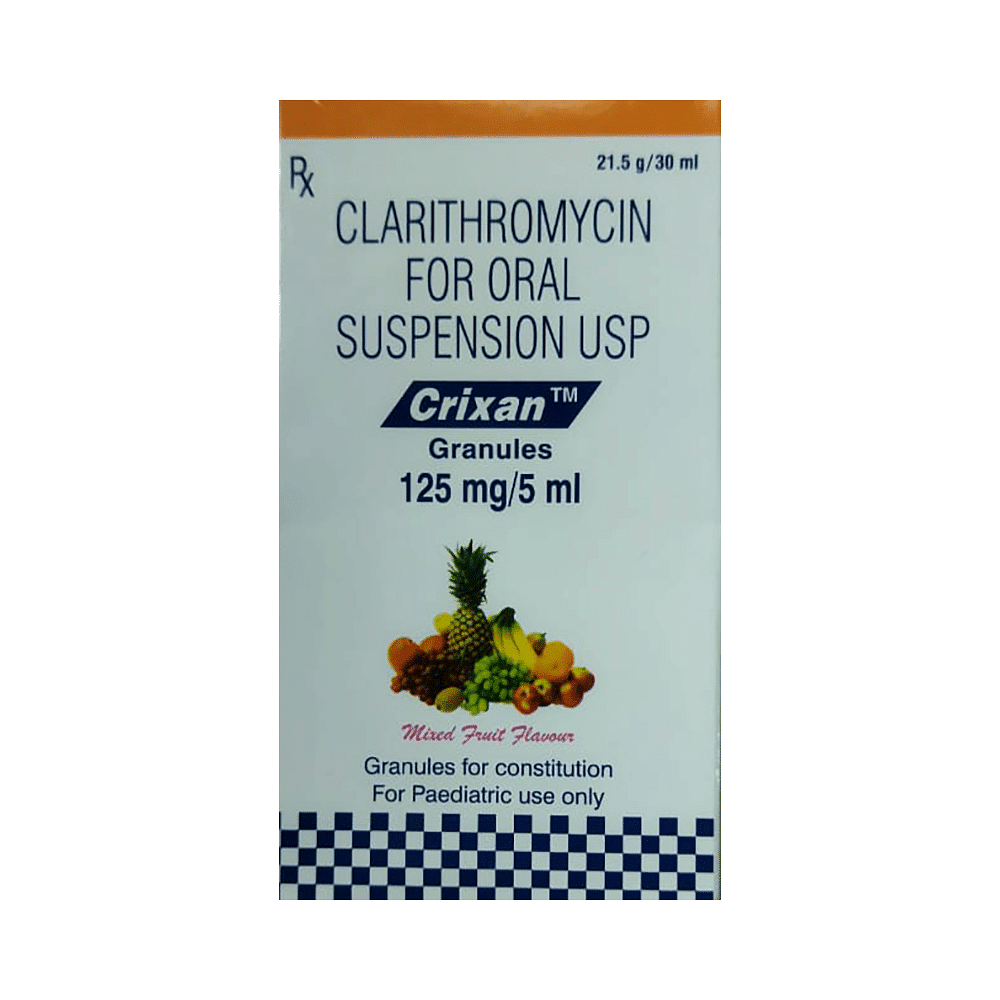
Clarithral 125 Oral Suspension
Manufacturer
Innovative Pharmaceuticals
Salt Composition
Clarithromycin (125mg/5ml)
Key Information
Short Description
Clarithral 125 Oral Suspension is an antibiotic medication used to treat a wide range of bacterial infections in children.
Dosage Form
Oral Suspension
Introduction
Clarithral 125 Oral Suspension is an antibiotic medication prescribed for children to treat various bacterial infections affecting the ear, throat, teeth, lungs, heart, skin, and gastrointestinal tract. It is also effective in treating bacterial infections in children with HIV due to their compromised immune systems. It is crucial to complete the entire course of this medication to prevent the recurrence of infection or the development of antibiotic resistance. Consult a doctor for any side effects or concerns.
Directions for Use
Administer the prescribed dose of Clarithral 125 Oral Suspension to your child as directed by the doctor. Ensure the full course is completed.
How it works
Clarithral 125 Oral Suspension works by inhibiting the bacteria from utilizing proteins necessary for their survival and function, thereby stopping the growth and spread of the infection.
Quick Tips
Your child must complete the entire course of this medicine. Encourage your child to drink plenty of water if diarrhea develops. Do not use for cold & flu unless advised by the doctor. Only use for the current infection, do not save for future use. Stop the medicine and contact the doctor if an itchy rash, facial swelling, or breathing difficulties occur.
Related Medicines

Crixan 125mg Granules Suspension Mixed Fruit

Claribid 125mg Syrup

Synclar 125 MG Dry Syrup Banana

Claron Oral Suspension

Eclarin Dry Syrup

Klariday Oral Suspension

Laritova Dry Syrup

Claridac 125mg/5ml Oral Suspension

Ediclar 125mg Oral Suspension

Calljoy 125mg Oral Suspension
Frequently asked questions
What is the correct dosage of Clarithral 125 Oral Suspension for my child?
The dosage of Clarithral 125 Oral Suspension is determined based on the type and severity of infection, your child's age, and weight. Taking the wrong dose or altering it without professional guidance could lead to side effects or make the medication ineffective. It's important to follow the prescribed dosage, timing, and method for consistent improvement. Always complete the full course of treatment as instructed, avoid stopping abruptly, and consult your doctor if you notice any side effects. Abruptly discontinuing the medicine may allow harmful bacteria to persist, potentially leading to recurring infections and increased resistance.
What should I do if I accidentally overdose my child with Clarithral 125 Oral Suspension?
Overdosing is uncommon with Clarithral 125 Oral Suspension but may still cause unwanted side effects. It's crucial to seek immediate medical attention if you suspect an overdose as it might worsen your child's condition or delay proper treatment. If you believe there was an accidental overdose, contact a doctor immediately.
Are there any serious potential side effects of Clarithral 125 Oral Suspension?
Possible severe side effects include abnormal heart rhythm (QT prolongation), allergic reactions, diarrhea, and severe gastrointestinal infections (superinfections). If your child experiences any of these symptoms, it is essential to seek immediate medical help.
Can I administer Clarithral 125 Oral Suspension alongside other medications?
Clarithral 125 Oral Suspension may interact with other medications or substances. Always inform your doctor about all other medications your child is taking before starting Clarithral 125 Oral Suspension. It's crucial to consult a healthcare professional for medication guidance.
Can I get my child vaccinated while on treatment with Clarithral 125 Oral Suspension?
Generally, antibiotics do not interfere with vaccines or cause adverse reactions. However, children taking antibiotics should avoid vaccination until they are fully recovered from the illness. After recovery, your doctor can guide you about administering the vaccine.
What lab tests should my child undergo while on long-term treatment with Clarithral 125 Oral Suspension?
Periodically, a doctor may order kidney function and liver function tests as well as an ECG to monitor your child's condition during long-term treatment.
Can Clarithral 125 Oral Suspension negatively impact digestion in children?
Children are particularly sensitive to medications, and Clarithral 125 Oral Suspension can cause stomach upsets. Antibiotics also often kill off both harmful and beneficial bacteria in the digestive system, making your child more prone to gastrointestinal issues. If your child experiences diarrhea while on Clarithral 125 Oral Suspension, do not stop taking it immediately; contact your doctor for advice instead. In some cases, a dosage adjustment might be necessary.
My child has a neuromuscular disorder. Is Clarithral 125 Oral Suspension safe to administer?
Clarithral 125 Oral Suspension must be used cautiously in children with neuromuscular disorders like Myasthenia gravis as it can worsen symptoms or even trigger new ones.
How does bacterial resistance develop against Clarithral 125 Oral Suspension?
Using Clarithral 125 Oral Suspension when not needed gives bacteria the opportunity to adapt and become resistant to its effects. This happens when treatment is discontinued or if the dose is incorrect, allowing harmful bacteria to survive while beneficial ones are killed.


